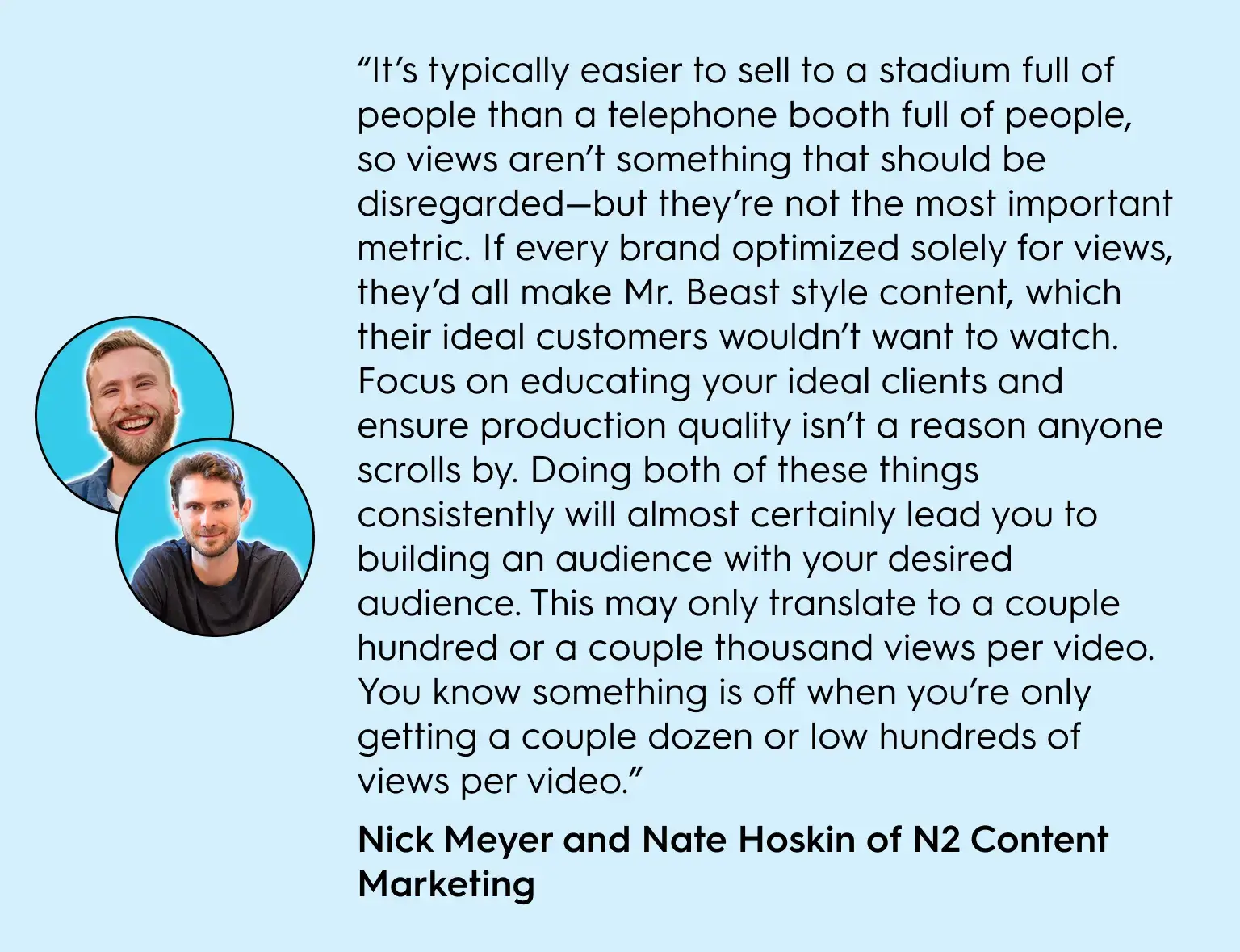How Many Views Does It Take to Be Taken Seriously?
%20(1).webp)
Short-form video content has rewritten the laws of credibility, and not in a way that’s flattering to anyone with a marketing degree. Somewhere right now, a teenager is racking up 2.3 million views for eating cereal while your brand’s carefully scripted, agency-polished clip is stuck at 102. And yes, the kid is being taken more seriously.
Look, it’s not personal. The internet’s jury doesn’t deliberate. The crowd doesn’t audit budgets. The algorithm certainly doesn’t hand out sympathy points for effort. A view is currency, and the exchange rate depends on who’s watching, how long they stay, and whether they bother to remember you after the scroll.
That’s the uncomfortable bit. The part that doesn’t fit in a quarterly report. Because if you’re counting views without counting what they mean, you might just be building the biggest audience of people who’ll never buy a thing.
{{form-component}}
Your 10K Views Might Be Worth Less Than You Think
You’ve been programmed to equate views with validation—but what if that metric is straight-up lying to you?
The obsession with view count isn’t new—it’s rooted in the age-old human fetish for herd behavior, aka social proof. We see a high number and think, “It must be worth paying attention to.” That surprised permission slip is as old as Influence by Cialdini. It happens in short‑form video marketing all the time, and brands keep playing into it, even when it doesn’t deliver results.
Minutes Watched ≠ Loyalty Earned
In the U.S. alone, users swallow 4.8 billion minutes of TikTok content per day—more than Instagram—yet how many of those minutes actually translate to brand trust? Probably less than you think.
That’s attention, sure. But only loyalty happens when someone watches because they care, not because the algorithm whispered their name.
There’s a hollow satisfaction in a view count that makes your ego swell. But if the views are from random scroll-bys—not your target customers—then you’re just playing digital Peacocking. And that kind of crowd doesn't shop; it only claps.
This isn’t a plea to kill the view chase entirely. But if your marketing strategy treats views like a bank account, you’re depositing in pennies when you need dollars—especially in short‑form video for business.
The 3 Stages of View Credibility
You know that feeling when you’ve got views—but nothing else? It’s like getting claps for karaoke but no one actually remembered the chorus.
You need a credibility model that doesn’t lie. Here it is:
Random Watch
These are the accidental scroll-past eyeballs. Retention under 25%. No comments. No shares. Just noise bouncing off their thumbs. It’s the digital equivalent of shouting into a void.
{{cta-component}}
Qualified Watch
Now we’re talking. Retention 50%+. Comments, shares, or likes from the actual audience you’re targeting. Maybe a repeat viewer or two. This is where short-form video tools and strategy start to pay off. You’re not just generating engagement—you’re building trust.
Brand Proof Watch
This is rare air. Imagine the right person reposts your clip. An industry newsletter picks it up. A prospect says, “Saw your video—let’s talk.” That’s the kind of credibility that moves invoices. These are the moments worth everything except vanity metrics.
Turns out, research in short-form video marketing shows that relatability and meaningful engagement, not mindless views, boost purchase intent—especially with Gen Z.
If your metrics don’t tell you who watched more than once—or whether they came back for more—you’re flying blind. Views are easy. Credibility isn’t.
Why “View” Doesn’t Mean the Same Thing Everywhere
You’ve been treating “view” like universal truth. That’s like trusting horoscopes to run your marketing budget. Time to wake up.
TikTok
TikTok counts a view the moment your clip starts playing—yes, even if it’s less than a second. For videos longer than three minutes, TikTok demands just three seconds to tag it as a view. Repeat viewers add up, too.
So when you brag about 10K views, remember: half might be algorithm-triggered curiosity—not actual attention.
Instagram Reels
Instagram also leans dumb on view definition. A view on a Reels clip counts after only about three seconds, and replays won’t double-dip. Your own plays don’t get tallied.
So: someone swiped, it loaded, and voilà—they “watched.”
YouTube Shorts: Now Just as Lazy
As of March 31, 2025, YouTube now counts any start or replay of a Short as a view—no minimum watch time. But they still track “engaged views” (real watches) behind the scenes for real metrics and payment eligibility. Basically, public view counts got overnight bloated—but you can still find truth if you know where to look.
Quick Reference: View Definition by Platform
%20(1).webp)
(Yes, your mom’s pity-watch on Instagram may count more than a genuine TikTok scroll, algorithmically.)
If you’re building your short-form video marketing on view counts alone, you’re stacking vanity metrics instead of value. True traction comes from watching patterns, meaningful interactions, and the right viewer coming back—things view totals mask.
You’re not aiming for applause. You want focus. And focus won’t be fooled by auto-play numbers.
Why Some People with Fewer Views Get More Engagement
Some creators with 2,000 views are taken more seriously than brands clocking 200,000. And no, it’s not witchcraft. It’s math, psychology, and audience relevance rolled into one very inconvenient fact.
In short-form video for business, engagement isn’t about how many eyeballs grazed your content—it’s about how many of the right eyeballs stopped, cared, and acted. A recent report shows TikTok creators under 15K followers often have higher engagement rates than larger accounts, proving small numbers can be deceptively powerful.
Targeted Beats Massive Every Time
Think about it: 5,000 targeted views from decision-makers in your industry can outweigh 500,000 random scrolls from people who will never buy from you. That’s not small—it’s efficient. When short-form video engagement aligns with your actual customer base, the authority you build lasts longer than the dopamine hit of inflated view counts.
Tracking retention, shares, and repeat viewers shows you who’s leaning in versus who’s passing by.
Nick Meyer & Nate Hoskin of N2 Content Marketing put it bluntly:

The Real “Credibility Hack”
Small view counts don’t equal small credibility—irrelevant view counts do. The real hack isn’t chasing virality; it’s engineering authority. A tight loop of qualified engagement trumps a bloated vanity metric every single time. And when your analytics can show who engages and why, suddenly the size of your audience matters less than the seriousness of their attention.
The 30-Day “Taken Seriously” Challenge
If you’ve ever wondered whether your short-form video is building credibility or just chewing bandwidth, here’s a reality check: you can find out in 30 days. No million-dollar budget. No viral lottery ticket. Just ruthless consistency and honest analytics.
The plan is deceptively simple—almost insultingly so. But the difference between a brand that gets laughed off feeds and a brand that gets followed by its ICP is whether you can pull this off without excuses.
Cadence Is King
Commit to posting 3–5 videos per week for 30 days. That’s the minimum dosage for testing short-form video tips in a way algorithms actually respect. Anything less is like running one lap and declaring yourself marathon-ready.
Variables That Actually Matter
Forget overthinking backdrops or whether your font screams “startup chic.” Instead, test:
- Hook type (question, bold claim, data-drop).
- Runtime (under 30s vs. 45–60s).
- Visual cue (captions, jump cuts, motion text).
- CTA format (soft ask, hard ask, no ask).
Each tweak becomes a signal you can measure—not a creative gamble.
{{form-component}}
Metrics That Tell the Truth
Your view count will lie to you. These won’t:
- Retention % (are they watching past the hook?).
- Saves & shares (are you snackable enough to revisit?).
- ICP engagement rate (are the right people—not randos—commenting?).
The challenge ends when at least three of your videos in the month hit “Qualified Watch” level or better. If none do, it’s not the algorithm’s fault—it’s the content, cadence, or targeting.
Where ZoomSphere Fits
Tools matter because discipline fails. ZoomSphere’s Scheduler keeps you consistent, Workflow Manager gets approvals unstuck, and Analytics tracks the metrics that actually decide whether your video earns credibility or collects dust. And yes, ZoomSphere cuts through vanity metrics to show you the retention, engagement, and data that makes or breaks authority.
Thirty days. Twenty posts. One simple audit: do people take you seriously, or are you just another background noise account? The clock is ticking.
So… How Many Views?
Short-form video is a strange currency. A million views can buy you absolutely nothing, while a few thousand, in the right hands, can buy you credibility that sticks for years. The magic number isn’t printed on the screen—it’s hiding in who’s watching, why they’re watching, and whether they come back for more.
If the right people watch you twice, that’s equity. If the wrong people watch you once, that’s confetti—pretty, but useless when the party’s over. And yet, so many brands keep stockpiling confetti, mistaking noise for authority.
Forget the internet’s obsession with arbitrary thresholds. Test yourself: 30 days, consistent posting, clear targets, and actual measurement of qualified engagement. If more than a handful of your posts pull in the viewers that matter (repeatedly) you’re in the credibility club.
Everything else is just an applause track for your ego.












Heading 1
Heading 2
Heading 3
Heading 4
Heading 5
Heading 6
Lorem ipsum dolor sit amet, consectetur adipiscing elit, sed do eiusmod tempor incididunt ut labore et dolore magna aliqua. Ut enim ad minim veniam, quis nostrud exercitation ullamco laboris nisi ut aliquip ex ea commodo consequat. Duis aute irure dolor in reprehenderit in voluptate velit esse cillum dolore eu fugiat nulla pariatur.
Block quote
Ordered list

- Item 1
- Item 2
- Item 3
Unordered list
- Item A
- Item B
- Item C
Bold text
Emphasis
Superscript
Subscript



.webp)


%20(1).webp)
%20(1).webp)


